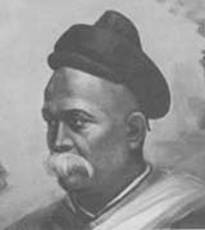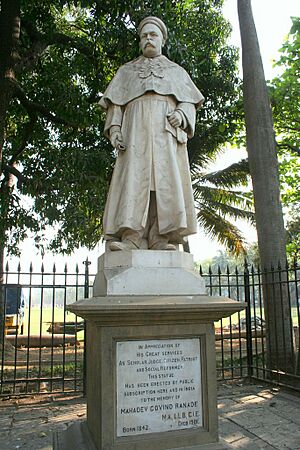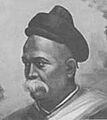Mahadev Govind Ranade facts for kids
Quick facts for kids
Mahadev Govind Ranade
|
|
|---|---|
 |
|
| Born | 18 January 1842 |
| Died | January 16, 1901 (aged 58) |
| Citizenship | British Indian |
| Alma mater | University of Bombay |
| Occupation | Scholar, social reformer, author |
| Known for | Co-founder of Indian National Congress |
| Political party | Indian National Congress |
| Spouse(s) | Ramabai Ranade |
| Honours | Rao Bahadur Companion of the Order of the Indian Empire |
Rao Bahadur Mahadev Govind Ranade (18 January 1842–16 January 1901) was an important Indian scholar, social reformer, judge, and author. People often called him Nyayamurti Ranade, which means "Justice Ranade." He was one of the people who helped start the Indian National Congress party. He also held important positions like being a member of the Bombay Legislative Council and the Finance Committee. He also served as a judge in the Bombay High Court in Maharashtra.
Ranade was a calm and hopeful person. His positive attitude helped him deal with the British government and work for changes in India. He helped create important groups like the Poona Sarvajanik Sabha and Prarthana Samaj. He also edited a newspaper called Induprakash, which shared his ideas about improving society and religion. He was given the special title of Rao Bahadur.
Contents
Early Life and Education

Mahadev Govind Ranade was born in Niphad, a town in the Nashik district. His family belonged to the Chitpavan Brahmin community. He first went to a school where he learned in the Marathi language. Later, he switched to an English-speaking school.
When he was 14, he went to Elphinstone College in Bombay. He was among the very first students at the University of Bombay. In 1862, he earned his first degree, a B.A., in history and economics. In 1864, he got his M.A. in history. Three years later, in 1866, he completed his law degree, an L.L.B..
A Career as a Judge
After getting his law degree, Ranade became a subordinate judge in Pune in 1871. He was very active in politics and popular with the public. Because of this, the British rulers waited a long time to promote him. He finally became a judge of the Bombay High Court in 1895.
Working for Social Change
Ranade was a forward-thinking social activist. His ideas were greatly shaped by Western culture and the British government. He worked on many different areas of reform. These included religious changes, public education, and improvements within Indian families.
He believed that Indian customs and traditions needed to be updated. He worked hard to make Indian society more like Western society in some ways. He said that the goal of the Indian Social Reform Movement was to "Humanize, Equalize and Spiritualize" society. This meant he felt Indian society needed to become more kind, fair, and spiritual.
The Prarthana Samaj
In 1867, Ranade joined the Prarthana Samaj. This was a group focused on religious and social reform. He also joined the Poona Prarthana Samaj in 1869. Many historians see Ranade as a key thinker and leader in this movement. He believed that the work of the Prarthana Samaj for social justice was connected to Christian ideas about right and wrong.
Helping Women and Girls
Ranade focused much of his effort on improving the lives of women. He wanted to make Indian society more "Humanized and Equalized." He spoke out against the 'purdah system', which meant keeping women hidden behind veils.
He also helped start the Social Conference movement. He supported this movement throughout his life. His efforts aimed to stop child marriage and the practice of tonsure (shaving the heads) of widows. He also worked to reduce the high costs of weddings and other social events. He fought against caste rules that stopped people from traveling abroad.
Ranade strongly supported widows being allowed to remarry and girls getting an education. In 1861, when he was still a teenager, he helped create the 'Widow Marriage Association'. This group encouraged Hindu widows to remarry. It also worked with the British government to pass laws allowing such marriages.
Starting a Girls' School
In 1885, Ranade worked with Vaman Abaji Modak and Dr. R. G. Bhandarkar. Together, they started the Maharashtra Girls Education Society. This society then opened Huzurpaga, which is the oldest girls' high school in India. The school was built in Narayan Peth, Pune, in what used to be the stable yard of the Peshwa ruler Bajirao I.
Personal Life
Ranade was in his thirties when his first wife passed away. His family wanted him to marry again, especially since he did not have any children. His friends, who were also reformers, hoped he would marry a widow. This would have matched his own beliefs, as he had helped start the 'Widow Marriage Association' years earlier.
However, Ranade chose to follow his family's wishes and tradition. He married Ramabai Ranade, a girl who was much younger than him. Ramabai was born in 1862, about a year after Ranade had founded his 'Widow Marriage Association'. He agreed to this marriage because he thought that if he married a widow, any children they had might not be fully accepted by his society. It is interesting that even though Ranade faced some criticism for this choice, his wish for children did not come true; his second marriage also remained childless.
The wedding followed all traditions and was a happy one. Ramabai came from the Kurlekar family, which was in the same social group as Ranade's family. Their marriage was very harmonious and traditional. Ranade made sure his wife received an education. At first, she was not very eager to study. But, like many Indian women of that time, she followed her husband's wishes and grew into her new life. After Ranade's death, Ramabai Ranade continued the important social and educational work he had started.
See Also
- Revolutionary movement for Indian independence
- List of Indian independence activists
Images for kids
 | Emma Amos |
 | Edward Mitchell Bannister |
 | Larry D. Alexander |
 | Ernie Barnes |



